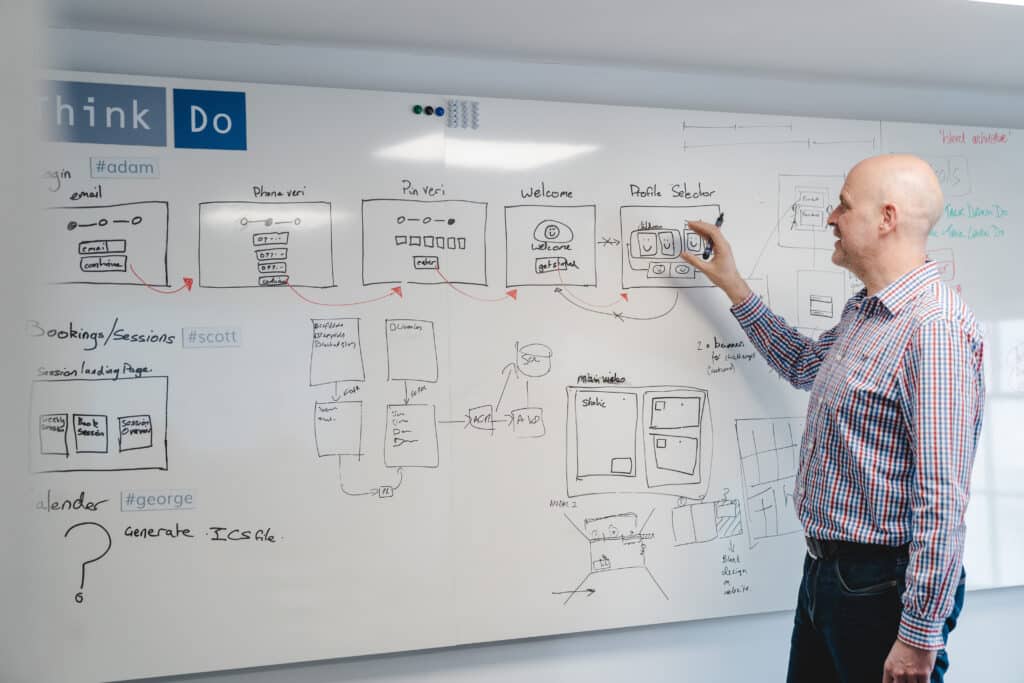From Integration to Innovation: Exploring Custom AI Solutions for Businesses

Every milestone hit in the technology space is sure to be closely followed by businesses utilising it to its fullest potential. And few milestones have been discussed, debated, and considered like the growth of AI capabilities.
The Talk Think Do team and I have often discussed the applications of AI for businesses (take a glance through our resources for more on that.) But today, I wanted to focus on the role custom AI solutions play in helping modern businesses succeed.
The evolving landscape of AI technologies offers significant advantages for organizations, particularly when leveraging tailored AI capabilities.
Let’s explore how your business’s AI journey can progress from integration to innovation with the help of the right custom solutions.
Introduction to AI Business Integration
AI business integration is the process of incorporating artificial intelligence into business operations to enhance efficiency, drive innovation, and gain a competitive edge. By integrating AI into your business, you can automate repetitive tasks such as data entry, freeing up valuable time and resources. This allows your team to focus on more strategic activities that drive growth and innovation.
Custom AI solutions tailored to your specific business needs can provide a significant competitive advantage. For instance, AI-powered chatbots can enhance customer interactions by providing 24/7 support, leading to improved customer satisfaction. Predictive analytics can help you anticipate market trends and predict customer behavior, enabling proactive decision-making and optimized business processes.
The integration of AI into business operations can lead to significant cost savings, improved customer satisfaction, and increased revenue growth. AI technology can streamline operations such as inventory management and supply chain operations by automating tasks and providing real-time insights. By leveraging AI, businesses can drive innovation, improve operational efficiency, and gain a sustainable competitive advantage.
AI business integration is a critical step for companies looking to stay ahead of the curve and achieve long-term success. By adopting AI solutions that are tailored to your objectives, you can ensure that your business remains competitive and continues to grow in an ever-evolving market.
AI and businesses: how did we get here?
Automation technologies marked the beginning of AI in businesses. The initial goal of AI was to automate repetitive tasks and simple data processing, helping companies cut down on time and resources without risking their output quality. Explore the balance between automation and human creativity.
But, because of that sole focus on enhancing efficiency and reducing human error in routine tasks, these early applications were often limited in their scope and capability. AI technology has now evolved to address more complex functions, like data analysis, customer service, and supply chain optimisation.
The 1980s brought a lot of significant advancements for AI, particularly in expert systems, a type of AI technology designed to emulate the decision-making abilities of a human expert in a specific domain1. These developments paved the way for more sophisticated AI applications capable of learning from data and making informed decisions. However, it wasn’t until the last decade that AI truly began to make a substantial impact on business operations, driven by exponential increases in computing power, the availability of large datasets, and advancements in algorithms. Now, the time is for businesses to consider how AI can be customised to fit their specific needs and targets, including adapting and creating innovative business models.
Additionally, businesses utilizing custom AI architectures can handle significantly larger increases in data volume compared to those relying on standard solutions. Effective management of data volume is crucial for enhancing data quality and reducing operational delays.
Current trends
Today, AI integration in business has progressed far beyond simple automation. Modern AI applications encompass a wide range of functionalities, including predictive analytics, intelligent process automation, and better customer service through AI-powered chatbots and virtual assistants. The focus is still largely on streamlining operations but now includes just as much of a focus on providing deeper insights and more personalised experiences for customers. Generative AI, combined with other technologies like IoT, enhances operational efficiency and drives innovation across various sectors, including finance and manufacturing.
For instance, predictive analytics can help your business anticipate market trends and customer behaviours, allowing for proactive decision-making and strategy formulation. AI-driven data integrations are helpful in managing vast amounts of data more efficiently, transforming raw data into actionable insights. Additionally, AI-powered chatbots enhance customer service by providing instant, personalised responses, improving customer satisfaction and freeing up human resources for more complex tasks. Seamless integration of these AI solutions simplifies the deployment of customized systems, enhancing overall performance and scalability, enabling organizations to address their unique challenges effectively.
Understanding Business Operations
Business operations refer to the internal processes and systems that enable a company to deliver its products or services to customers. Understanding these operations is crucial for effective AI integration, as it allows companies to identify areas where AI can add the most value.
Business operations encompass tasks such as data collection, data analysis, and decision-making, all of which can be automated or enhanced through AI. For example, AI can optimize routine tasks and complex processes by providing real-time insights and automating repetitive tasks. This not only improves efficiency but also allows for more informed decision-making.
By understanding business operations, companies can identify opportunities for AI adoption and develop a tailored AI strategy that meets their specific needs. AI can transform business operations, enabling companies to become more agile, efficient, and innovative. This transformation can lead to improved business outcomes, such as revenue growth and enhanced customer satisfaction.
Effective AI integration requires a deep understanding of business operations and a clear AI strategy that aligns with business goals. By focusing on these aspects, companies can ensure that their AI initiatives are successful and deliver the desired results.
Types of custom AI solutions for your business to consider
I’ve referred to some of the cases where an AI tool can be leveraged by businesses for greater workflows and outcomes. Let’s dive into the specific types of custom AI solutions your business could utilise and why they’re valuable:
- Predictive analytics: Utilising historical data to forecast future trends, allowing businesses to anticipate market changes and customer behaviours. For example, Microsoft AI’s assistant Copilot can assist in generating predictive models within Excel, providing actionable insights from your data.
- Natural Language Processing (NLP): Enabling machines to understand and respond to human language. Custom solutions include AI-powered chatbots for customer service, sentiment analysis for customer feedback, and automated document processing for extracting information from unstructured text.
- Computer vision: Training machines to interpret and make decisions based on visual data. This can be made more specific to industries, like manufacturing businesses using this feature for quality control, as well as more agnostic use cases like security and surveillance.
- Recommendation systems: Analysing user behaviour and preferences to suggest products, services, or content. These systems are used in e-commerce for personalised product recommendations, in streaming services for content suggestions, and in content platforms for tailored article recommendations.
- Robotic Process Automation (RPA): Automating repetitive tasks and streamlining business processes. Custom RPA solutions can include invoice processing, data entry, and compliance reporting.
- Fraud detection: Identifying patterns and anomalies that indicate fraudulent activities. Custom fraud detection solutions are crucial for financial services to monitor transactions in real-time, e-commerce for detecting suspicious purchasing behaviour, and insurance for identifying fraudulent claims.
- Supply chain optimisation: Enhancing supply chain operations by predicting demand, managing inventory, and improving logistics. Applications include inventory management to maintain optimal levels, route optimisation to reduce delivery costs, and supplier management to select reliable suppliers.
- Custom AI development platforms: Providing tools and frameworks for building, training, and deploying machine learning models tailored to specific business needs. Going back to Microsoft Copilot as an example, the tool can assist developers by generating code snippets, automating code documentation, and suggesting improvements, thus enhancing productivity.
The above covers just a few examples of how different industries can use custom AI solutions to their specific advantage. The reality is that there are many more ways that AI can be tailored to assist businesses in their goals — nailing down which of those your business should use comes down to:
- Following best practices for implementing AI.
- Understanding the strategies your business should follow when developing and integrating a custom AI solution.
- Knowing when to rely on the help of external expertise to fully leverage the benefits of tailored solutions.
AI Implementation Strategies
AI implementation strategies vary depending on the specific business needs and goals of a company. A custom AI solution tailored to your unique needs can provide a competitive edge and drive innovation. These strategies can include the use of AI models, such as machine learning models, to automate tasks and provide valuable insights.
Companies can also utilize off-the-shelf AI tools, such as AI-powered chatbots, to enhance customer interactions and automate tasks. These tools can be quickly integrated into existing systems, providing immediate benefits. However, for more complex needs, custom AI solutions are often more effective.
AI implementation strategies should be aligned with business goals and objectives, such as improving operational efficiency and driving revenue growth. A successful AI implementation strategy requires a clear understanding of business operations and a tailored AI solution that meets specific needs. Predictive analytics, for example, can be used to predict customer behavior and optimize business processes.
By developing a comprehensive AI implementation strategy, companies can ensure effective AI integration and achieve long-term success. This involves not only selecting the right AI tools and models but also continuously monitoring and updating them to maintain their effectiveness and relevance.
Decision Making with Data Driven Insights
Data-driven insights are critical for effective decision-making in business, and AI can provide valuable insights to inform these decisions. AI can analyze large datasets and provide real-time insights, enabling companies to make data-driven decisions that drive growth and innovation.
Predictive analytics, for example, can be used to predict customer behavior and optimize business processes. AI-powered chatbots can also provide insights into customer interactions and preferences, enabling companies to make informed decisions that enhance customer satisfaction.
Data-driven insights can be used to drive innovation, improve operational efficiency, and gain a competitive edge. By transforming raw data into valuable insights, AI enables companies to make informed decisions that drive business growth. AI can also identify patterns and trends in data, providing a deeper understanding of business operations.
By leveraging AI to provide data-driven insights, companies can make informed decisions and achieve long-term success. This approach not only improves decision-making but also enhances overall business performance, ensuring that companies remain competitive in a rapidly changing market.
Major takeaways on custom AI for businesses
I could go on and on about the applications of AI. The main takeaway I want businesses to have from how AI has evolved over its many decades of inception is that it’s not a catch-all solution anymore. It’s an approach that’s integral to organisational success and growth, with data quality playing a critical role in ensuring successful outcomes.
With that said, AI adoption shouldn’t be a race. You may feel the pressure of competitors announcing new AI integrations into their business. But the priority should be on adopting AI solutions that are tailored to your objectives and plans towards reaching said objectives.
Proprietary data can provide tailored insights and superior performance, making it essential for achieving a competitive edge and optimizing AI development.
Here, we’ll cover what should be top-of-mind for you as you pursue custom AI solutions for your business.
- Data collection and preparation: Robust data collection and preparation processes are the first step to creating AI models that are accurate and reliable. This involves gathering high-quality data from diverse sources, cleaning and annotating the data, and updating those datasets to reflect any changes in insights or circumstances.
- Algorithm selection and model training: Evaluate multiple techniques and approaches to determine the most effective methods for your specific use cases. Common approaches include iterative testing and fine-tuning so that your models can meet desired accuracy and reliability standards.
- Integration into your business workflows: One of the largest benefits of custom AI solutions are that they’re intended to seamlessly incorporate into daily operations, enhancing rather than disrupting existing workflows. This integration often involves creating APIs and pipelines that allow AI models to interact with other business systems, resulting in real-time data exchange and decision-making.
- Monitoring and updating: As with any new tech, AI models have to be constantly monitored and updated to maintain their effectiveness, relevance, and competitive advantage. In this case, your business should establish feedback loops that allow you to collect usage data, identify performance issues, and make necessary adjustments.
- Ethical and data privacy considerations: As AI becomes more regulated in the face of widespread adoption, it’s crucial to address any ethical or data privacy concerns that may come from you taking up an AI solution. This includes using secure data storage, anonymising personal data, and being transparent with your customers and stakeholders about how AI systems are used and the decisions they make.
- Strategic partnerships: Collaborating with AI service providers, consultants, and development partners can accelerate the implementation of custom AI solutions. Plus, they can act as valuable sources of expertise and best practices for your in-house teams, helping you overcome technical challenges and achieve your AI goals more efficiently.
Experience true innovation with personalised AI support
Remember, the path from integration to innovation with AI is a constant journey of learning and adaptation. By staying informed and proactive, your business can not only keep up with the advancements in AI but also unlock new revenue streams and lead in innovation and efficiency.
If you’re ready to explore how custom AI solutions can drive your business forward, consider getting in touch with a member of our team for a consultation. We can hear out everything from your plans for AI to potential challenges and work with you to suggest the best possible approach for your business.
Implementing customized AI solutions also involves crucial aspects of risk management. Tailored security controls help address specific risk profiles and compliance obligations, particularly in regulated industries, while improving visibility into AI systems.
Let’s innovate together and unlock the full potential of AI for your business.
Get access to our monthly
roundup of news and insights
You can unsubscribe from these communications at any time. For more information on how to unsubscribe, our privacy practices, and how we are committed to protecting and respecting your privacy, please review our Privacy Policy.
See our Latest Insights
Shipping AI in the Real World: Lessons From Our Latest Cycle
AI moves pretty fast. If you don't stop and look around once in a while, you could miss it. Recognising this, we have been running a structured approach to AI adoption for production systems. A critical element is ensuring we keep up with the latest approaches while retaining safety, responsibility and avoiding inefficiencies cause by...
Working as One Team: How Our Business Analysts Bridge Vision and Delivery
When clients partner with us, they often expect engineers and designers. But one of the most powerful roles behind a successful digital product is often less visible: the Business Analyst (BA). At Talk Think Do, BAs aren’t just requirement-gatherers. We’re connectors, between vision and execution, users and features, partners and platforms. In the recent delivery…
Implementing RAG AI Search on On-Premise Files with our AI Search Accelerator
As demand for AI‑powered tools like Microsoft Copilot grows, many organisations are asking the same question: “How can we harness the power of generative AI without moving our sensitive data to the cloud?” In this guide, we’ll explain why Retrieval‑Augmented Generation (RAG) is so effective for on‑premise data and walk through a practical approach using…
Legacy systems are costing your business growth.
Get your free guide to adopting cloud software to drive business growth.




